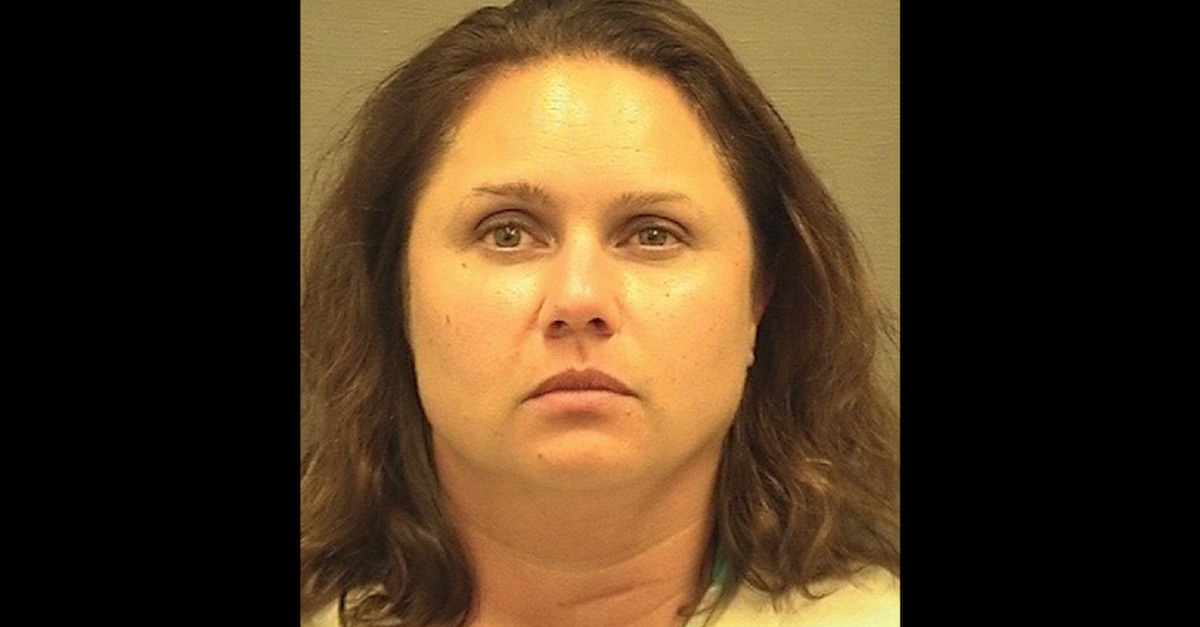
Alexandria Sheriff’s Office
The former U.S. Treasury senior staffer who leaked tens of thousands of records laying bare investigations into the world of illicit financing globally will not be released from federal prison early, a federal judge ruled on Tuesday.
Natalie Mayflower Sours Edwards, a 43-year-old former senior advisor to the Treasury’s Financial Crimes Enforcement Network (FinCEN), claimed to have been a whistleblower when she leaked a record-breaking trove of suspicious activity reports, also known as SARs, to BuzzFeed reporter Jason Leopold.
BuzzFeed subsequently teamed up with the International Consortium of Investigative Journalists and more than 400 journalists in 88 countries to pick apart and publish what became known as the “FinCEN Files.” As summarized by BuzzFeed, the catalogue of 200,000 suspicious financial transactions provided an “unprecedented view of global financial corruption, the banks enabling it, and the government agencies that watch as it flourishes.”
U.S. District Judge Gregory Woods, a Barack Obama appointee, found Edwards’s disclosures to be a reckless exposure of the U.S. national security secrets she was sworn to protect.
“Dr. Sours Edwards disclosed approximately 50,000 records, including at least 2,000 individual SARs, to someone who she knew intended to make them public,” Woods wrote on Tuesday. “Among the materials that Dr. Sours Edwards disclosed were leads regarding financing for the terrorist organization, Hezbollah. […] She also disclosed information about ongoing sensitive law enforcement operations.”
The judge added that the files that she leaked could have tipped off financial criminals and implicated the privacy of innocent third parties.
“SARs are used by investigatory agencies to unearth money laundering, terrorism and other crimes,” the ruling states. “Their disclosure harms the interests of law enforcement and the privacy interests of innocent people who may be the subject of the reports.”
Currently serving a 6-month sentence inside the West Virginia-based Federal Prison Camp Alderson, Edwards is currently slated to be released on Feb. 28 of this year. She sought her immediate release amid the spread of the COVID-19 pandemic among prison populations.
Judge Woods, who postponed her sentencing multiple times because of that spread, denied that any sentencing break was deserved.
“The defendant’s reported negative experiences in prison do not materially impact the Court’s evaluation of the sentencing factors,” Woods wrote. “The defendant’s crime was very serious. The Court considered the defendant’s medical history and the existence of COVID in the federal jail system at the time of sentencing. The manifestations of those issues described in her memorandum and supporting declaration do not materially change the Court’s evaluation. The Court’s evaluation of the need for personal and general deterrence has not changed. Nor has its assessment of the other sentencing factors.”
Since publishing the trove, BuzzFeed vocally defended Edwards for disclosing more than 200,000 suspicious financial transactions valued at more than $2 trillion across multiple global financial institutions for nearly two decades. Her supporters say that the files show regulators of banks doing little to stop apparent money laundering and other financial crimes.
News organizations like the European-based Organized Crime and Corruption Reporting Project (OCCRP) teamed up with Courthouse News on what FinCEN knew about convicted Iranian-Turkish money launderer Reza Zarrab, the man behind a multibillion-dollar scheme to bust U.S. sanctions against Iran.
OCCRP also worked with Law&Crime on what Standard Chartered bank may have known about Zarrab’s conspiracy with Turkey’s state-run Halkbank.
Denying that she was a whistleblower, prosecutors said that Edwards leaked the files to advance her “own political agenda, which included disrupting or distracting from the investigation of Special Counsel Robert S. Mueller III.” Edwards opined in one private message that the special counsel “needs to go down too,” prosecutors said.
Edwards made her disclosures during the height of Mueller’s investigation into Russian interference in the 2016 presidential election.
“Of course, none of the SARs called into question the basis or propriety of the Special Counsel’s investigation either, although leaking certain of the SARs might reasonably have been expected to negatively impact it,” Assistant U.S. Attorney Kimberly J. Raven wrote in a sentencing memo in October 2020. “And that was precisely what it appears the defendant hoped would happen.”
A now-deleted Twitter account attributed to Edwards in the government’s memo showed a hodgepodge of far-right conspiracy theories and causes, including pro-Trump memes, criticism of COVID-19 mask restrictions, and a retweet of a call by Rep. Marjorie Taylor Greene (R-Ga.) to impeach President Joe Biden.
She also, from that account, retweeted a post suggesting that she was framed, even though her supporters argue that she should be pardoned for her now-admitted actions.
Read the judge’s ruling below:
(Photo from the Alexandria Sheriff’s Office)